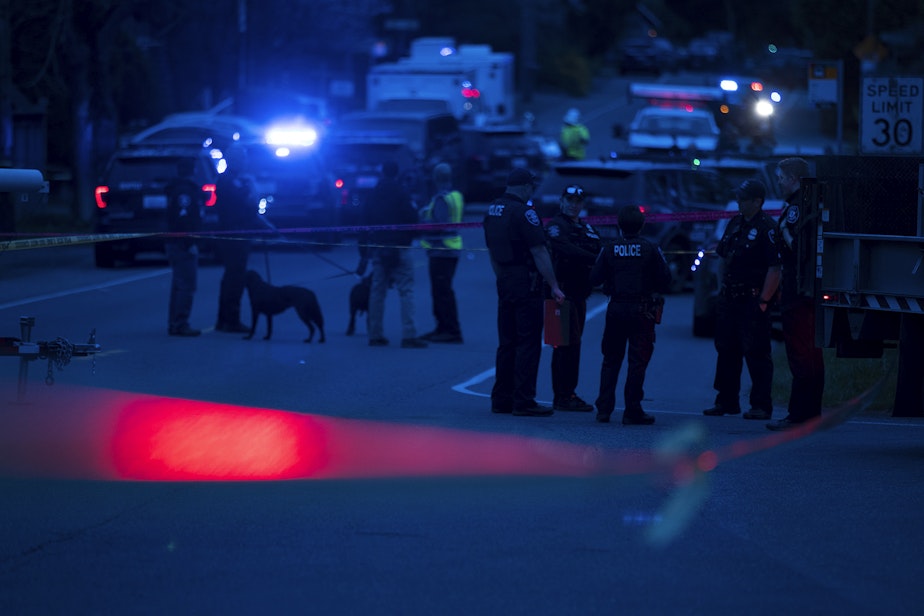Judge: Seattle police fall out of compliance with federal oversight

The Seattle Police Department's accountability system does not comply with the federal consent decree on use of force. That’s the ruling by a federal judge Wednesday. City officials say they aren't sure what the remedy will be.
U.S. District Court Judge James Robart said "the city has fallen partially out of full and effective compliance" with the decree, but may still be able to stay on track to exit federal oversight next year.
He cited the case of Officer Adley Shepherd, who was fired in 2016 after an incident two years before when he punched a handcuffed woman in the back of a patrol car. A labor ruling reinstated Shepherd, with an arbitrator saying Shepherd broke department policy but deserved a lesser punishment.
Judge Robart said he wasn’t deciding whether the decision in the Shepherd case was right or wrong, but that the arbitration process the department uses had weakened the system to the point of violating the consent decree.
His decision echoed concerns from Seattle's Community Police Commission (CPC), a civilian advisory group. They argued in court filings that the police union's new bargaining agreement weakened accountability legislation aimed at fulfilling the court-ordered reforms. That agreement would make it more difficult to uphold disciplinary findings against problem officers, the CPC said.
CPC members said they’re gratified that the judge raised this concern and is listening to them.
Sponsored
You can read the CPC's arguments here:
CPC advisor Anne Levinson said Robart "was saying that, by and large, officers are doing a great job. But when something goes wrong, the accountability system needs to be strong enough to be effective for the public.”
She said it's clear these provisions of the police contract must be renegotiated. “He wants the parties to go back to the table and bring back stronger contracts," Levinson said. "The CPC laid out a number of ways the contracts could be strengthened so now it will be up to the city and the Department of Justice to go back to the table and show how they’re going to do that.”
But city officials said they're not clear what Robart's comments mean for the police contract. Mayor Jenny Durkan said she talked to four different lawyers who were in the courtroom and they gave four different answers as to what being out of compliance means, and what next steps the city will have to take.
Sponsored
They said they need to see the judge’s written order, which should be filed next week. "And then we want to see what the next steps are," Durkan said. "Are there different things we have to bring to the court’s attention to supplement the record? Are there things that we need to do to go back to the bargaining table? Are there things we can do without going to the bargaining table..."
City officials hope that they can make corrections to remain in compliance through January 2020, when the consent decree could be terminated. City Attorney Pete Holmes also said he needs to read Robart's order. He said while Robart called Seattle "partially out of compliance" with the consent decree, Holmes said,“I also heard him say, 'I’m not rejecting the collective bargaining agreement.'”
In Wednesday's hearing, Judge Robart emphasized there have been profound changes in the Seattle department over the past decade, with officers better trained and better led. He said the Office of Police Accountability, the civilian-led agency that reviews use of force incidents, is doing a "very good job."
And he said the department’s effort in crisis intervention had become a national model on de-escalation and "deserves a great deal of credit."
Andrè Taylor, who helped change state law to make it easier to prosecute police officers for misuse of deadly force, welcomed Robart's accountability findings. “I’m glad that he said it’s not over," Taylor said. "That makes me feel better. That there’s still more work to do.” He said Robart's findings that use of force by officers is low and public confidence high may not resonate with communities of color.
Sponsored
The union representing rank-and-file police officers declined to comment on Judge Robart’s decision until the written order is filed. But SPOG President Kevin Stuckey said in a statement, “The Seattle Police Officers Guild would like to remind everyone that we have a valid contract (through 2020) tht was negotiated in good faith, ratified by our membership and signed into law by Mayor Durkan.”





